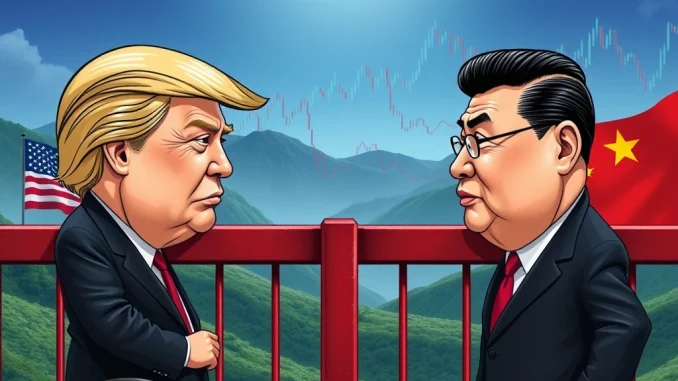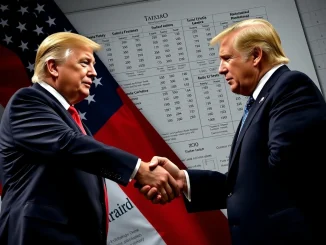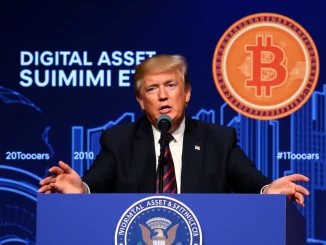
In a move that could significantly escalate global economic tensions, former U.S. President Donald Trump has reportedly suggested an aggressive 80% tariff on Chinese imports. This statement, attributed to a report by Walter Bloomberg on X, injects fresh uncertainty into the delicate balance of US-China trade relations and raises questions about potential impacts on global markets.
What’s Behind Trump’s Stance on China Tariffs?
Donald Trump’s previous presidency was marked by significant friction with China, largely centered around trade imbalances and intellectual property disputes. His administration imposed substantial tariffs on various Chinese goods, initiating what many termed a ‘Trade War’. The reported suggestion of an 80% tariff indicates a potential continuation, or even intensification, of this approach if he were to return to office.
Tariffs are essentially taxes on imported goods. The goal is often to make foreign products more expensive, thereby encouraging consumers and businesses to buy domestically produced goods. While proponents argue this protects domestic industries and jobs, critics point to potential downsides:
- Increased costs for consumers due to higher import prices.
- Retaliatory tariffs from affected countries, harming domestic export industries.
- Disruption of global supply chains.
- Reduced international trade and economic growth.
An 80% tariff on a broad range of Chinese Imports would be a dramatic increase, potentially leading to significant economic ripple effects.
How Could Renewed US-China Trade Tensions Impact Global Markets?
The relationship between the United States and China is arguably the most critical economic dynamic globally. Any significant shift, particularly one involving aggressive trade measures, sends jitters through financial markets worldwide. The potential for a renewed or intensified Trade War could have several implications:
Market volatility often increases during periods of heightened geopolitical and economic tension. Uncertainty makes investors cautious, potentially leading to sell-offs in riskier assets.
Global supply chains, already strained by recent events, could face further disruption as companies look to reduce reliance on Chinese imports or find alternative manufacturing locations. This could lead to higher production costs and potential inflationary pressures.
The economic growth outlook for both the U.S. and China, as well as countries deeply integrated into their trade networks, could be negatively impacted by reduced trade flows and investment.
Connecting the Dots: Trade Wars and Investor Sentiment
While seemingly distant from the world of decentralized finance, major macroeconomic shifts and geopolitical tensions like those arising from a potential US-China trade escalation can influence investor sentiment across all asset classes, including cryptocurrencies.
Historically, periods of significant economic uncertainty have sometimes seen increased interest in alternative assets. However, the impact is complex and not always straightforward. Factors such as the strength of the U.S. dollar, inflation expectations, and the overall risk appetite of investors all play a role.
Monitoring developments related to Trump‘s potential trade policies and the response from China is crucial for understanding the broader economic environment that can indirectly affect the crypto market.
What Does This Mean for the Future of Chinese Imports?
An 80% tariff would drastically alter the economics of importing goods from China into the United States. Many U.S. businesses rely heavily on Chinese Imports for components, finished goods, and raw materials. Such a high tariff would force difficult decisions:
- Absorb the cost (unlikely for most businesses).
- Pass the cost onto consumers (leading to higher prices).
- Find alternative suppliers outside of China (a complex and often costly process).
- Move manufacturing operations (a long-term, expensive undertaking).
This would undoubtedly lead to significant disruption for businesses and potentially contribute to inflation for consumers.
Conclusion: Watching Global Dynamics
Donald Trump’s reported comment about an 80% tariff on Chinese imports serves as a stark reminder that geopolitical and trade policies from major global players can have far-reaching consequences. While the direct link to cryptocurrency might seem tenuous, the potential for escalating a Trade War between the US and China highlights the interconnectedness of global markets. Increased economic uncertainty, shifts in investor sentiment, and disruptions to trade flows are all factors that can influence the broader financial landscape, including the performance of digital assets. As the political climate evolves, market participants will be closely watching for further signals regarding the future of US-China trade relations and their potential impact on the global economy.



